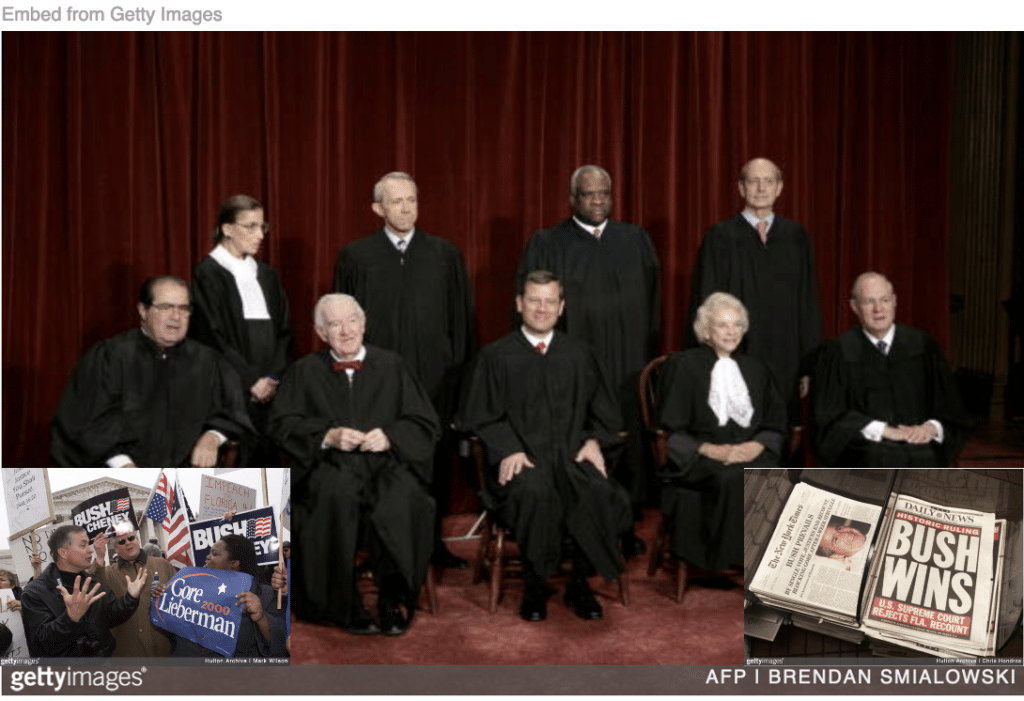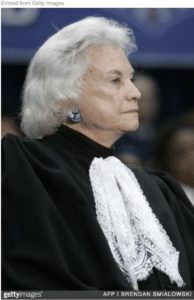
The tainted legacy of Sandra Day O’Connor
Sandra Day O’Connor was the first woman on the US Supreme Court. Her legacy is assured, especially given the pivotal role she played in Planned Parenthood of Southeast Pennsylvania v. Casey, upholding abortion rights.
But her pioneering legacy is forever tainted by her vote in Bush v. Gore. To understand why, consider how different America and the world might have been under President Al Gore.
Of course, the US Supreme Court intervened in the 2000 presidential election by agreeing to take that infamous case. It effectively handed the presidency to George W. Bush. Moreover, it set a precedent for political candidates using the courts to win elections they lost at the polls.
Bush v. Gore and the Court’s credibility
The Court has not handed a more ill-advised decision since its ill-fated Plessy v. Ferguson decision in 1896. Plessy established the ‘separate-but-equal‘ doctrine that underpinned Jim Crow laws. These laws codified presumptions of White supremacy, stemming from America’s original sin of slavery.
The irony is that the Court did not have to intervene, undermining its credibility. After all, the election came down to Florida – a Republican-controlled state. And there were many generally accepted ways for political machinations to give the state to Bush.
Not to mention that Gore did not even win his home state of Tennessee. That alone made him unworthy of winning the election. Besides, had he done so, he would’ve won the presidency regardless of the Court-rendered outcome in Florida.

I cannot overstate that the Court exercised poor, if not biased, judgment in hearing this case. The damage this did to its reputation is incalculable.
But I have continually decried the hypocrisy inherent in Republican justices masquerading their judicial activism as a conservative jurisprudential philosophy. I did so most recently in “Supreme Court to Rule on Landmark Healthcare Reform Law” on November 23, 2011.
The justice regrets
Now-retired Justice O’Connor expressed profound regret for being on the Court that took Bush v. Gore:
It took the case and decided it at a time when it was still a big election issue. Maybe the Court should have said, ‘We’re not going to take it, goodbye…’ [Taking it] gave the Court a less-than-perfect reputation.
(New York Times, April 29, 2013)
That affirms my indictment of the Supreme Court’s decision to intervene in that fateful presidential election of 2000. With all due respect to cases like Dred Scot and Plessy, this was arguably the most polarizing case in US history. This leads me to believe that concern about her legacy inspired this regret.
 She probably wishes that, like Bush, she had a library and museum dedicated to spinning her revisionist take on the seminal events of her tenure.
She probably wishes that, like Bush, she had a library and museum dedicated to spinning her revisionist take on the seminal events of her tenure.
For example, in his Bushworld, the invasion of Iraq might be recorded for posterity not as the most costly military blunder in the history of mankind, but as a holy crusade to spread freedom, and rid the world of the most evil tyrant since Adolf Hitler.
Frankly, O’Connor’s real regret should be that she did not have the judicial courage and foresight to vote with the liberal justices in Bush v. Gore.
Retired Justice John Paul Stevens wrote in his 2011 memoir that it was not only “frivolous” but also brazenly political for the Court to be deciding a presidential election. Regretfully, he and the other liberal justices could not get O’Connor and the other conservative justices to see that.
If Gore had won Bush v. Gore
I have argued the merits of Bush v. Gore more times than I care to count. Doing so invariably involved counterfactual debates about our world if Gore had won.
But all such arguments and debates are moot. Last week’s dedication of the Bush presidential library in Texas brought this into stark relief.
* This commentary was originally published on May 1, 2013 at 5:43 am.